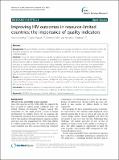| dc.contributor.author | Ahonkhai, Aimalohi A | |
| dc.contributor.author | Bassett, Ingrid Valerie | |
| dc.contributor.author | Ferris, Timothy Gregg | |
| dc.contributor.author | Freedberg, Kenneth Alan | |
| dc.date.accessioned | 2013-05-09T13:21:21Z | |
| dc.date.issued | 2012 | |
| dc.identifier.citation | Ahonkhai, Aima A., Ingrid Valerie Bassett, Timothy Gregg Ferris, and Kenneth Alan Freedberg. 2012. Improving HIV outcomes in resource-limited countries: The importance of quality indicators. BMC Health Services Research 12:427. | en_US |
| dc.identifier.issn | 1472-6963 | en_US |
| dc.identifier.uri | http://nrs.harvard.edu/urn-3:HUL.InstRepos:10612915 | |
| dc.description.abstract | Background: Resource-limited countries increasingly depend on quality indicators to improve outcomes within HIV treatment programs, but indicators of program performance suitable for use at the local program level remain underdeveloped. Methods: Using the existing literature as a guide, we applied standard quality improvement (QI) concepts to the continuum of HIV care from HIV diagnosis, to enrollment and retention in care, and highlighted critical service delivery process steps to identify opportunities for performance indicator development. We then identified existing indicators to measure program performance, citing examples used by pivotal donor agencies, and assessed their feasibility for use in surveying local program performance. Clinical delivery steps without existing performance measures were identified as opportunities for measure development. Using National Quality Forum (NQF) criteria as a guide, we developed measurement concepts suitable for use at the local program level that address existing gaps in program performance assessment. Results: This analysis of the HIV continuum of care identified seven critical process steps providing numerous opportunities for performance measurement. Analysis of care delivery process steps and the application of NQF criteria identified 24 new measure concepts that are potentially useful for improving operational performance in HIV care at the local level. Conclusion: An evidence-based set of program-level quality indicators is critical for the improvement of HIV care in resource-limited settings. These performance indicators should be utilized as treatment programs continue to grow. | en_US |
| dc.language.iso | en_US | en_US |
| dc.publisher | BioMed Central | en_US |
| dc.relation.isversionof | doi:10.1186/1472-6963-12-427 | en_US |
| dc.relation.hasversion | http://www.ncbi.nlm.nih.gov/pmc/articles/PMC3536601/pdf/ | en_US |
| dash.license | LAA | |
| dc.subject | HIV/AIDS | en_US |
| dc.subject | Resource-poor | en_US |
| dc.subject | Quality indicator | en_US |
| dc.subject | Quality improvement | en_US |
| dc.title | Improving HIV Outcomes in Resource-Limited Countries: The Importance of Quality Indicators | en_US |
| dc.type | Journal Article | en_US |
| dc.description.version | Version of Record | en_US |
| dc.relation.journal | BMC Health Services Research | en_US |
| dash.depositing.author | Ahonkhai, Aimalohi A | |
| dc.date.available | 2013-05-09T13:21:21Z | |
| dc.identifier.doi | 10.1186/1472-6963-12-427 | * |
| dash.contributor.affiliated | Ahonkhai, Aimalohi A. | |
| dash.contributor.affiliated | Ferris, Timothy | |
| dash.contributor.affiliated | Bassett, Ingrid | |
| dash.contributor.affiliated | Freedberg, Kenneth | |


